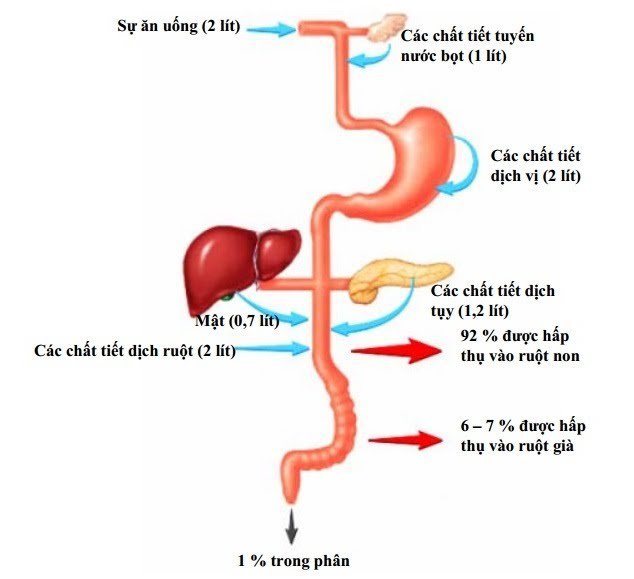What to eat after stomach cancer surgery?
Patients after gastric cancer surgery may have part or all of their stomach removed, which means that the patient will have to take extra care, not only what to eat and drink but also when eat and drink. So what to eat after stomach cancer surgery?
1. How the body processes food after gastric bypass surgery
Before gastric bypass surgery, patients often experience nausea as a side effect of chemotherapy, leading to patients having less appetite and weight loss.
Stomach cancer surgery will change the patient's life. About a year or two after surgery, the patient's body can adjust to the absence of a stomach.
Immediately after surgery, the patient will spend about 5 days in the hospital to recover. Until you can eat again by mouth, the patient will receive nutrients intravenously or through a nasogastric tube.
The patient will then start on a liquid diet a few days after surgery and switch to a light diet for about a week after surgery.
Normally, the patient's stomach functions to hold food and initiate the digestive process. Food then moves from the stomach to the duodenum, which is the first part of the small intestine. If these processes do not occur, the food will not be fully digested.
Also, if the valve that controls food leaving the stomach and into the small intestine is removed, food will pass through the digestive system faster and the person will not be able to absorb as many nutrients as before.
As you recover, you may feel your stomach get smaller or disappear, making you feel full faster. After surgery, the way your body digests food will be very different from before surgery. For example, sugar can cause dumping syndrome after gastrectomy, in which excess water is drawn into the stomach or small intestine and food moves too quickly through the digestive system. This is one of the complications after gastric bypass surgery.

Sơ đồ các thể tích chất lỏng trong đường tiêu hóa và hấp thu chất dinh dưỡng
Symptoms of this syndrome include cramps and diarrhea. These symptoms can begin within 20 minutes of eating. People who are lactose intolerant prior to surgery may experience this complication. In addition, fat can be more difficult to digest than sugar.
2. What does gastric cancer surgery eat?
There are a number of measures that the patient can take to limit the discomfort caused by the inability to digest food encountered in the early post-surgery period, specifically as follows:
Instead of eating three meals a day, divide the sick person's food into smaller and more frequent meals; Chew food thoroughly and eat slowly; Drink plenty of fluids (eight to ten glasses, or about 8 ounces per day), but don't drink too much during or around meals. Cut down on carbonated drinks like soda; With the doctor's permission, the patient can gradually add sugar, fat, and milk back; Do not eat a lot of fiber. Because fiber can make the patient feel full quickly and uncomfortable;

Người bệnh cần hạn chế ăn quá nhiều chất xơ
Patients should keep a food diary to help themselves find the foods that cause unpleasant symptoms and thereby, help the patient avoid these foods, thereby alleviating uncomfortable problems after surgery; Patients should focus on foods that are high in calories, nutrient dense, and low in sugar. If you're losing weight or are worried you're not getting enough nutrients from food, you can take vitamin and mineral supplements, especially if you've had gastric bypass surgery. For more detailed information, patients should consult their doctor about dietary supplements.
If the patient has had a total gastrectomy, they will need regular vitamin B12 injections. But if part of the stomach is removed, choose foods that are high in iron, calcium, vitamin C and vitamin D. Additionally, blood tests can help your doctor know if your nutritional status is. and whether the diet needs to be adjusted or not.
To avoid stomach cancer, you should be screened for cancer early, especially if you have a family history of cancer such as esophageal and stomach cancer or are regularly exposed to risk factors such as healthy eating habits. accustomed to eating salty and sour foods, smoking regularly, working in a polluted environment.
Currently, Vinmec International General Hospital is providing a package of screening and early detection of stomach cancer. Customers will receive:
Gastroenterology Specialist Examination with an oncologist (by appointment). Screening for esophageal and gastric cancer through endoscopy: esophagogastroduodenoscopy, stomach, duodenum (with NBI machine, with anesthesia). Coagulation test by automated thrombin time test, activated partial thromboplastin time by automatic machine. General abdominal ultrasound.

Khách hàng sử dụng dịch vụ nội soi dạ dày tại Vinmec
To register for an examination at Vinmec International General Hospital, please book an appointment on the website to be served.
Reference source: webmd.com
Để đặt lịch khám tại viện, Quý khách vui lòng bấm số HOTLINE hoặc đặt lịch trực tiếp TẠI ĐÂY. Tải và đặt lịch khám tự động trên ứng dụng MyVinmec để quản lý, theo dõi lịch và đặt hẹn mọi lúc mọi nơi ngay trên ứng dụng.
Bài viết này được viết cho người đọc tại Sài Gòn, Hà Nội, Hồ Chí Minh, Phú Quốc, Nha Trang, Hạ Long, Hải Phòng, Đà Nẵng.






